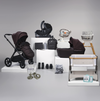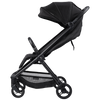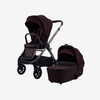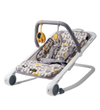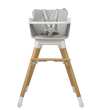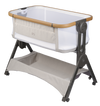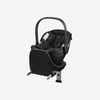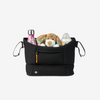If this is your first baby, you might be wondering how the next few months will work out. That’s why we’ve put together a baby development week by week guide for weeks 1-8!
Baby Development Week by Week - 1-4 Weeks
1 week
You might think your one-week old baby won’t be up to much. But did you know your newborn can recognise you already? Your baby can hear your voice, and although he or she can’t understand what you’re saying, they will feel comforted by your words.
Newborns try to get used to their new surroundings, so keep talking in the early baby stages. Your voice will make them feel reassured and loved. Also, give your tiny tot lots of skin-to-skin contact. It can really improve you and your baby’s bond.
Don’t be surprised if your baby’s weight changes a lot in their first week. Depending on if your baby is formula-fed or breastfed, they’ll usually lose between 5-10% of their bodyweight. Newborns regain this weight gradually over the next two weeks.
Normally, babies are weighed at birth, then again when they’re five and 10 days old. This way, your doctor or health visitor can keep an eye on your baby’s development week by week.
2 weeks
A two-week old baby can’t see very well, but it’s amazing how quickly they’ll start to familiarise themselves with your face. A baby’s vision is pretty fuzzy unless you’re around eight inches from their face, so give your little one lots of smiles and up-close cuddles. This will help your baby learn to focus. Eventually, he or she will begin to copy your movements. Try looking at your newborn while moving your head side to side and see if your baby follows.
Two-week old babies also cry – a lot. It’s their only way of communicating what they need. Whether your baby is hungry, sleepy, too hot, too cold or overstimulated, they’ll let you know by crying. That’s ok – you’ll soon work out what all the different cues mean!
3 weeks
Your baby development week by week is moving forward all the time. And the three-week mark is no different! Your baby should be reacting to all different kinds of noise now. He or she may get a shock if there are loud sounds, like a door banging shut or something falling on the floor. But it’s good to allow your infant to get used to the noise so you can build a baby routine. That way, you don’t have to say silent when they’re asleep.
Your baby will also start to move more by their third week. These movements are usually quite jerky and random. Think lots of flailing arms and kicking legs! Here, your baby is learning about their body as their muscles are developing.
4 weeks
Your four-week old baby’s eyesight and hearing will be developing well. If you make a noise on the other side of the room, your baby might try to turn to see where it’s coming from.
Four-week old babies are better at mimicry too, often repeating (or attempting to!) the sounds you make. Keep chatting and cooing to your baby and your baby will start to understand what different noises mean.
Well done on surviving the first month with your baby! You’re probably exhausted – sleep deprivation is very real for new parents. Little ones might start to sleep through the night at four weeks, but sometimes it can be closer to four months. In the meantime, let’s check out baby development week by week for their second month!
Baby Development Week by Week - 4-8 Weeks
5 weeks
All your cuddles, singing and funny faces have paid off, because at five weeks, your baby might give you a smile! Their cognitive and social skills are getting better, so smile back at your baby to help them learn about communication.
Five-week old infants are also usually more alert and will take fewer naps. Previously, your baby might have only stayed awake for 6-8 hours a day. But by five weeks, babies can be up and about for almost 10 hours. Hopefully, a baby which is awake for longer during the daytime will mean they’ll sleep longer at night. However, this isn’t always the case!
6 weeks
As well as cognitive development, your baby will have physically grown a lot by six weeks. You might discover your tot is hungrier than ever, which is expected with their increasing size. Baby’s muscles will be getting stronger too. He or she will try to lift their head, doing what looks like mini press ups! Those jerky movements from week three will have much more purpose as your baby’s body grows.
7 weeks
Seven-week old babies are beginning to become much more engaged with the world around them. Stimulate your baby’s senses with new sounds like music or show them colourful toys. Let your little one enjoy play time in a baby bouncer – they’re sure to love the springy movements! Whatever you do, participate in lots of baby activities at seven weeks old to support their social development.
8 weeks
We’re almost at the end of our baby development week by week guide. But there’s one more of the baby stages to consider – and it’s unfortunately not that pleasant.
At eight weeks, your baby is due their 6-in-1 vaccine, which protects them from dangerous diseases. The jab is free in the UK. It should be offered by your doctor or health visitor. After your baby’s vaccinations, they’ll probably feel distressed for a few days. But don’t worry – your little one just needs lots of snuggles and love. They’ll soon be back to their happy self!
For more parenting advice like our baby development week by week guide, check out the rest of the BabaBing! blog. From finding out what to pack in your baby changing bag to learning how to change a nappy, we’ve got the tips and tricks to make baby life a breeze.

